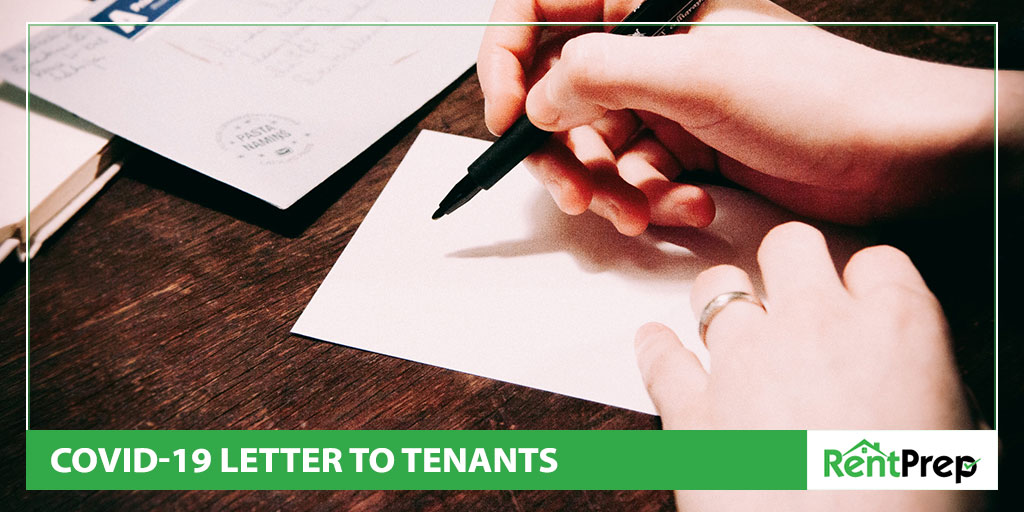
Updated January 2022
Have you created a system for keeping tenants informed on the latest news during the pandemic? Do you find it easy or difficult to communicate significant changes to tenants?
A COVID-19 letter to tenants can be a valuable tool for landlords, to remind tenants about rules, regulations, and safety recommendations that will keep everyone safe throughout this trying time. However, knowing what to say in that letter is not always as instinctual as the idea of sending one.
We’ve gathered together some essential resources, including a sample COVID-19 letter to tenants that you can use, which should help you to keep tenants up to date. Additionally, these resources may help provide clarity in these confusing times. Keep reading to learn more about handling COVID communications appropriately.
COVID-19 Letter To Tenants: Table Of Contents
Every good COVID-19 letter to tenants about safety needs to be written in a careful, mindful way to ensure that there are no misunderstandings. Do you know how to handle this type of sensitive communication? In today’s article, learn more about what to do and why getting it right matters.
- Why Landlords Must Stay Up To Date On COVID
- Sample COVID-19 Letter To Tenants
- Helping Your Tenants Find Help
- COVID-19 FAQs
- Be Proactive
Why Landlords Must Stay Up To Date On COVID

COVID-19, the ongoing pandemic that has had major effects in the U.S. and around the globe since early 2020, is an ever-evolving public health emergency. Due to the significant spread of disease around the world, organizations like the World Health Organization and the CDC have worked to keep people informed on how to best reduce risk and the spread of COVID-19.
Though you are not a public health official of any kind, you do work closely with your tenants. Part of your job, in fact, is to ensure that you keep your properties in habitable condition to ensure tenant safety. But do those standards extend to COVID-19, and how should you develop your actions to protect your community further?
There are many reasons why staying informed about COVID-19 is beneficial and necessary for the future of your business.
Be A Reliable Landlord
You want to be remembered as a reliable and helpful landlord. Leaving a positive impact will encourage tenants to rent from you long-term or to review your business favorably. This can help your business and reputation grow, and that’s a massive boon for future success.
By being a knowledgeable source of information for your tenants as they deal with the daily stresses of COVID-19, you can become a reliable figure in their lives. Something as simple as a letter to tenants regarding safety can help improve their image of you.
Mitigate Risk Factors
Whether you manage apartment units where many individuals live in close contact with one another or you have a few standalone houses for rent, you can help to reduce the risk of COVID-19 spreading by being a safety figurehead for your tenants.
Not everyone is well-informed about how to deal with the risks of COVID or what to do if they become ill. Providing a coronavirus notice to tenants cohesively and thoroughly can reduce the overall risk present in your apartment units, and that benefits everyone.
Outline Guidelines
The most concrete fact about this public health emergency is that the rules are constantly changing. By sending out a COVID-19 letter to tenants, you can give them the latest information about COVID, how it is affecting their rental unit, and what guidelines are currently being enforced on their housing.
Guidelines can be confusing. Reduce that confusion for yourself and for tenants by sending out letters on safety for tenants.
Define Expectations
Finally, you can customize any letters sent to tenants to ensure that you are defining expectations as they apply to yourself and to your tenants. You can remind tenants that they are still responsible for paying the rent, while also letting them know how you will continue to prioritize their safety during a public health crisis.
Clear communication is essential during this period. Without it, there will inevitably be miscommunications between you and your tenants. Defining expectations upfront can help to reduce these instances.
If you work with a property management company, collaborate with them to create a notice that you can send out as a team.
Sample COVID-19 Letter To Tenants
Below, we’ve created a sample coronavirus notice to tenants that you can use to keep them in the loop about guidance. Remember that this is only a template; you should update it to include relevant information that applies to your rental units and tenants.
Dear residents,
Due to the ongoing COVID-19 pandemic, management felt that it would be appropriate to give you some guidance as well as outline what precautions we are taking to reduce the risk for our tenants.
At this time, we are taking the following steps:
- The cleaning schedule has been increased to ensure shared spaces remain safe.
- Soap is available in community building bathrooms, and hand sanitizer can be found in the lobby.
- We are keeping tenants informed about CDC guidance and other updates as necessary.
- We are temporarily postponing social gatherings and other meetings that were scheduled to take place in the complex.
- All non-essential maintenance and property checks are delayed until further notice. If any emergency maintenance needs to be done, we will ensure that our employees and contractors follow the necessary safety protocols.
- Shared facilities, such as the gym or laundry, are being cleaned frequently and limited in use. We ask that tenants use these areas one unit at a time to avoid contact with other people, and we have posted this guidance there as well.
We will continue to monitor the situation about how we should proceed. If our precautionary plan changes, we will inform you.
In addition to those precautions, it is important that the community as a whole makes an effort to keep everyone safe. The CDC recommends the following:
- Wash hands frequently with soap and water for at least 20 seconds, and be extra careful to wash after touching shared surfaces.
- Wear a cloth mask when going into public.
- Hand sanitizer with 60% – 95% alcohol may be used instead of soap when hand washing is not possible.
- Cover your mouth with a tissue or in your elbow when coughing or sneezing.
- Avoid coming into close contact with anyone who is sick or showing symptoms.
- Try not to touch your nose, mouth, or face with your hands.
- Use disinfectant to clean shared and frequently touched surfaces.
If you become symptomatic or believe you were exposed to a positive COVID-19 case, please do the following:
- Call your doctor’s office or local health department before you travel to seek care; traveling with symptoms puts others at risk. They will advise you on how to proceed.
- Do not report to work or come in contact with others if you show symptoms. Call a doctor’s office and seek guidance.
- If you need emergency assistance due to your symptoms, contact 911 and emergency facilities immediately.
Please visit the CDC website for the most up-to-date guidance on safety precautions and what to do if you become sick.
If you have any concerns or questions about this situation and how we will be handling it going forward, please do not hesitate to contact us. We want to remain available for our tenants during this trying time, and we appreciate your efforts to keep the community safe.
Sincerely,
Management
Helping Your Tenants Find Help

During this time, you might find that your tenants are having trouble keeping up with monthly costs such as rent and utilities. While you cannot personally relieve them of these burdens without sacrificing your well-being, you can help them find useful resources.
One handy resource is the Consumer Financial Protection Bureau Rental Assistance Finder. This page will help tenants find programs that may be able to give them monthly assistance until they get back on their feet. If a tenant approaches you looking for assistance on handling their situation, recommend this page as a jumping-off point for moving forward.
Creating reference forms that you can use again and again is one of the best tips that experienced landlords pass on to new landlords. And now you can take that advice with a little assistance from RentPrep. We have put together a Landlord Form Bundle .This megapack gives you a huge bank of reference documents that can be used to create your own custom forms for future business.
Having the right forms to make your job easier is essential to becoming a better landlord. We are here to help you do just that!
COVID-19 FAQs
The pandemic has brought about many questions for landlords on how to handle their rental property. Here are the most frequently asked questions regarding landlords & COVID-19.
How do I keep my tenants safe from COVID-19?
Ultimately, it is impossible for you to completely protect your tenants from COVID-19. While there are a number of precautions that you can take in your management style to ensure you do not increase any risk factors, your tenants will be faced with the risk of COVID in other parts of their life regardless of how you do business.
Still, there is a lot that you as a landlord can do to ensure you are doing your part to help prevent this public health emergency from worsening.
First, make sure that you pay attention to the latest COVID-19 news and restrictions in your area. Be informed about mask laws, vaccine information, lockdowns, and where outbreaks are being monitored. Having this information keeps you in the loop, and it also enables you to answer questions tenants may come to you with.
Another thing that you can do to help keep your tenants safe is to create a beneficial resource for them to reference. A COVID-19 resource packet can give tenants information on what to do if they get sick, who to contact for information about vaccines, and a variety of other topics. Use our sample letter (above) to tenants during COVID to get some ideas. Becoming a landlord who has useful information available is likely to please worried tenants.
Finally, update tenants about policy changes for your business, common areas, and the community at large as they occur. For example, a local mandate may begin to require masks in common areas, and your business may decide to include your rental common rooms in this change. Notifying tenants and posting clear signage is necessary to help keep tenants safe and informed. Consider if email updates, newsletters, or bulletin boards can be used to share the most recent changes with tenants.
Are landlords responsible for the safety of tenants?
Landlords are not and will never be solely responsible for the safety of their tenants. However, landlords do carry a responsibility to follow all public health guidance in order to keep their tenants as safe as possible.
This means that you can and should enforce necessary mandates in common areas of any shared-unit buildings. These rules are dependent on your local restrictions, but it is your responsibility to be aware of those rules and to implement them as required in housing applications.
Your power to enforce mandates, however, has limits. As a business, you are permitted to set rules on how people must use common spaces, but you cannot tell a tenant what to do inside of their rental unit.
For example, you cannot require tenants to wear masks inside their homes even, while doing an inspection or having repairs done. Keep this in mind as you move forward, as this can be a complicated line to walk.
In conclusion, you are only responsible for your tenants’ safety so far as that safety falls under your responsibilities as defined by local and state landlord-tenant laws. If your tenant chooses to ignore the ongoing pandemic, it is not your responsibility to force them to act with greater caution.
How do you write a warning letter for a tenant during COVID-19?
While some counties and cities still have eviction moratoriums in place, rentals are back to business as usual in many other regions. This means that you can begin sending out warning letters, eviction notices, and more as things begin to return to normal.
However, it can feel like you are crossing a line when sending out a warning letter to a tenant during difficult times. A tenant that didn’t keep up with payments or upkeep during the lockdown, for example, might need to be reminded that it is time to start paying again. This requires that you reach out to the tenant, and you want to be sure you do so in a kind, yet firm, way.
The best way to do this is to include a line similar to the following in any type of warning letter that you send out to a tenant:
- We understand that the ongoing pandemic may have impacted your ability to carry out these responsibilities as a tenant, and we are not insensitive to this struggle. We would like to work this issue out with you in a way that works for both of us. Please reach out so that we can begin a conversation on how to move forward.
By including a clause like this, you can soften the blow of delivering a warning letter during the pandemic without completely removing your rights as a landlord. The best landlords are sensitive to tenant problems without giving away their business; it takes time to strike that balance.
Do landlords have to provide a safe environment if a tenant is not paying rent during the COVID-19 emergency?
Yes. Regardless of whether or not a tenant is paying rent, you as a landlord must continue to do the things that you are responsible for until the lease agreement is voided. This means that repairs, safety precautions, and all other management duties must be completed regardless of rent payment.
It can be frustrating to be responsible for the upkeep of a unit that you are not profiting from, but that has been one of the major side effects of dealing with this public health emergency. Landlords who are struggling to continue running their business should look into rent relief programs that will tide them over until tenants begin catching up on back payments and start paying on a monthly basis in the coming weeks.
Remember, you must continue to create a safe environment for your tenants while doing any necessary repairs. This means following public health guidance such as keeping six feet of distance when possible and wearing masks, particularly when repair personnel will be entering a tenant’s home. All of these regulations continue to apply whether or not rent has been paid.
As eviction moratoriums continue to expire across the country, you will be able to regain control of your rental situations moving forward.
Be Proactive
Regardless of how you need to continue managing COVID-19 risk and effects while running your business, it is key that you remain proactive. Rather than only reacting to things that happen, think ahead as much as possible. Open clear lines of communication with your tenants so everyone knows what to expect each step of the way.
Additionally, this will give tenants an easy pathway to discussing their payments, any missed payments, and how they can get back on track. As the rental business returns to normal, it’s important to start having these conversations. You can set the stage to make the conversations happen more easily.
By being proactive, you can set both yourself and your tenants up for better situations in the future. There are no benefits to leaving your tenants in the dark about changing policies, COVID-19 policies, or other aspects of your business. Instead, keep the lines of communication open.

